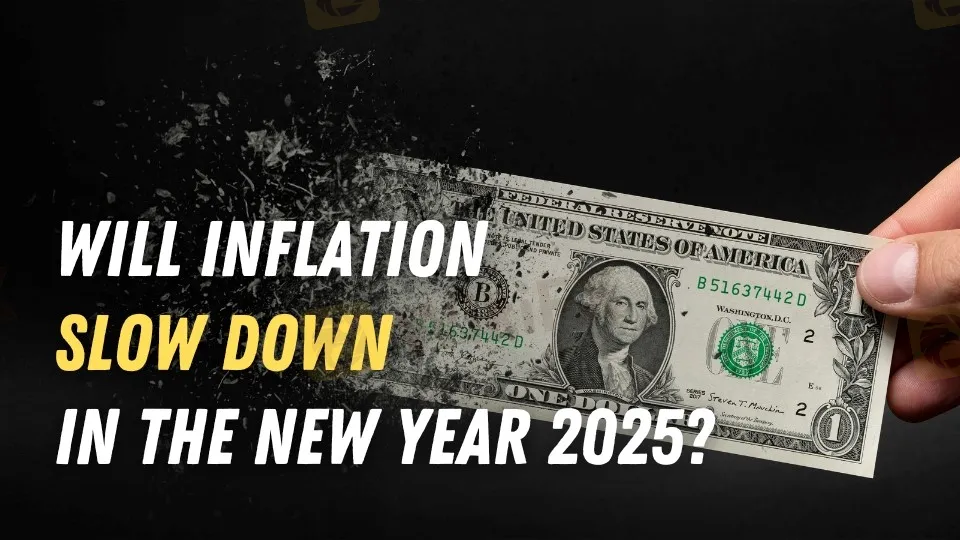简体中文
繁體中文
English
Pусский
日本語
ภาษาไทย
Tiếng Việt
Bahasa Indonesia
Español
हिन्दी
Filippiiniläinen
Français
Deutsch
Português
Türkçe
한국어
العربية
Will Inflation Slow Down in the New Year 2025?
Abstract:Will inflation slow down in 2025? Experts weigh in on projections, economic policies, and potential impacts, offering insights into what the new year may hold.

Inflation dominated economic debates in 2024, and analysts say it will be a major worry in 2025. Inflation projections vary greatly, affected by economic policy, global trade dynamics, and consumer behavior. The Federal Reserve and independent economists have provided several projections, providing a complicated picture of the coming year.
Inflation Forecasts for 2025
The Federal Reserve expects core Personal Consumption Expenditures (PCE) inflation to reach 2.5% in 2025, then fall to 2.2% in 2026, and converge with the long-term target of 2% by 2027. Bloomberg polled independent economists, who were slightly less hopeful. While they agree on a 2.5% core PCE inflation rate in 2025, they expect a slower decrease, with inflation settling at 2.4% in 2026.
President-elect Trump's economic proposals, including tariffs on China and other trading partners, probable immigration restrictions, and corporate tax cuts, have been flagged as possibly inflationary. These actions have the potential to aggravate price pressures and delay consumer relief.

Diverging Economic Outlooks
Some analysts, notably Nobel Prize-winning economist Joseph Stiglitz, are more pessimistic. Stiglitz has warned of a potential “inflationary spiral” that could result in retaliatory trade wars, impacting economic development. Similarly, BNP Paribas predicts that inflation will climb sharply from late 2025 to 2026. The Consumer Price Index (CPI) is expected to rise to 2.9% by the end of 2025 and 3.9% by the end of 2026, according to the BNP. The business also anticipates the Federal Reserve to keep interest rates unchanged until 2025, with no monetary easing.
Deutsche Bank shares the BNP's prediction, while other Wall Street firms anticipate two to three rate cuts in 2025, which is more in line with the Federal Reserve's projections. This discrepancy highlights the uncertainties surrounding inflationary trends.
Consumer and Market Effects
Consistent price increases in industries such as housing, insurance, and healthcare are likely to keep consumer spending under pressure. Shelter costs are likely to fall slightly in 2025, but they may stay high, adding to sticky inflation in the services sector. This could result in minimal respite for everyday bills.
There are certain advantages, though. The US economy has exhibited amazing resiliency, with strong growth, healthy consumer spending, and low unemployment rates giving a solid platform for 2025.
Final Thoughts
While estimates vary, the agreement is that inflation will be a significant issue in 2025. Key factors influencing price trajectory include trade policy, labor market developments, and Federal Reserve decisions. As consumers and businesses negotiate the uncertainty of the new year, they will need to keep an eye on these trends.

Disclaimer:
The views in this article only represent the author's personal views, and do not constitute investment advice on this platform. This platform does not guarantee the accuracy, completeness and timeliness of the information in the article, and will not be liable for any loss caused by the use of or reliance on the information in the article.
Read more

Shocking Move: Yen Breaks Past 140 Barrier!
The yen's breakout above the 140 mark has caught global attention, and the reasons behind it are more than technical.

FINRA fines SpeedRoute for alleged rule violations
The Financial Industry Regulatory Authority (FINRA) has imposed a $300,000 fine on SpeedRoute LLC for a series of supervisory, risk management, and anti-money laundering (AML) program deficiencies spanning from 2017 to the present. Of this amount, $75,000 is payable to FINRA, with the remainder offset by SpeedRoute’s limited ability to pay. In addition to the monetary penalty, SpeedRoute has been censured and ordered to overhaul its compliance framework, including enhancing its written supervisory procedures (WSPs) for market access controls and strengthening its AML program.

Nigeria's Oil Crisis: How Are Stakeholders Responding?
Despite being rich in oil, Nigeria struggles with refining shortages. What’s behind this paradox, and how are different actors reacting?

The 2025 Trade War: Why This Round Is Unlike Any Before
The 2025 iteration of the U.S.-China trade conflict has taken on a scale and complexity far surpassing previous episodes, marking a significant escalation under former President Donald Trump’s return to the White House.
WikiFX Broker
Latest News
Prop Trading Firms vs. CFD Brokers: Who’s Winning the Retail Trading Race?
TRADE.com UK Sold to NAGA Group Amid 2024 Revenue Drop
World Trading Tournament (WTT): The Game-Changer in Global Trading
Why Binance Tightens Crypto Transfer Rules for South Africans?
BaFin Flags 5 Unauthorised Financial Platforms for Consumer Risk
Germany’s April PMI Falls Below 50 as Service Sector Stumbles
PayPal Opens Regional Hub in Dubai, Expands Middle East Reach
FINRA fines SpeedRoute for alleged rule violations
RM15,000 Profit Turned into RM1.1 Million Loss for Engineer!
New to FX Trading? Stop! Read These Warnings First
Currency Calculator


